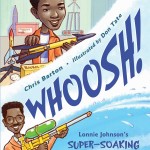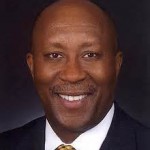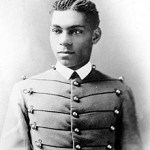These Black Pitmasters Are Hustling To Preserve Barbecue’s Roots
The popularity of Texas-style barbecue has white-washed a cuisine that was rooted in Native American and African heritage. These black pitmasters are trying to keep history intact.
Photo: A tray of meats and sides from Matt Horn’s Horn Barbecue in the Bay Area of Northern California.
(HuffPost Life) American barbecue often ignites a passionate discourse that can only come from a deep love and appreciation of tender, flavorful smoked meat. The debates are endless: Which state makes the best barbecue: Texas, Kansas, North Carolina, Missouri, Tennessee or Georgia? Sauce on the side or served on the meat? Which wood is ideal for smoking? Depending on who you ask, there is indeed a right way and a wrong way to approach barbecue, but often lost in the conversation are the black pitmasters, cooks and chefs throughout the country who are working to carry the culinary tradition into the future.
To have a real dialogue about barbecue, you must first be prepared to have unsavory conversations about the United States. From Kenya to Germany, many cultures have practices for roasting or smoking meat — but we wouldn’t be telling the complete story of barbecue heritage without acknowledging that the cooking technique was originally the byproduct of an exchange between Native Americans and enslaved Africans in the Caribbean beginning in the 16th century.
Michael Twitty, a food historian and author of the 2018 James Beard Foundation’s Book of the Year “The Cooking Gene: A Journey Through African American Culinary History in the Old South,” is one of the most vocal advocates for making sure the history of barbecue is not rewritten to downplay the contributions of those who crafted the art while suffering under oppression.
“If America is about people creating new worlds based on rebellion against oppression and slavery, then barbecue is the ideal dish: it was made by enslaved Africans with inspiration and contributions from Native Americans struggling to maintain their independence,” Twitty wrote in The Guardian, explaining how the narrative around barbecue’s roots often focuses on European influences. (more)
Why This Mexican Village Celebrates Juneteenth
Descendants of slaves who escaped across the southern border observe Texas’s emancipation holiday with their own unique traditions.
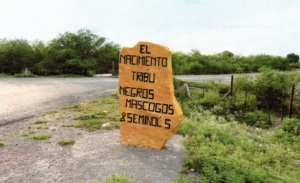 (Texas Monthly) The morning before Juneteenth, Corina Harrington and her sister Miriam Torralba left San Antonio shortly after sunrise and headed south to Mexico, retracing a portion of the same route their African American ancestors followed in 1850 when they escaped slavery in the United States and fled to freedom south of the border.
(Texas Monthly) The morning before Juneteenth, Corina Harrington and her sister Miriam Torralba left San Antonio shortly after sunrise and headed south to Mexico, retracing a portion of the same route their African American ancestors followed in 1850 when they escaped slavery in the United States and fled to freedom south of the border.
The sisters arrived around midday at their father’s house in the ranching village of Nacimiento de los Negros in Coahuila, about three hours south of Eagle Pass. As afternoon drifted toward evening, the blue silhouettes of the Sierra Madres were all but obscured by clouds, as siblings, cousins, extended family members, and childhood friends kept arriving in twos, threes, or fours. They strolled over to the cool and swift Río Sabinas to swim in water as clear as any Hill Country stream. They politely tasted the dried and shredded meat of a mountain lion that one of their cousins shot on their dad’s nearby goat ranch, and they laughed and reminisced and readied for one of the most important days of the year in a village whose name literally means “Birth of the Blacks.” (more)
The Accidental Invention of the Super Soaker
A leak in a heat pump gave rocket scientist Lonnie Johnson the idea for his powerful squirt gun
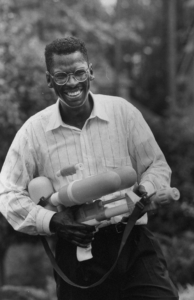
Lonnie Johnson, with his Super Soaker, outside his home in 1992. (Thomas S. England/The LIFE Images Collection via Getty Images)
(Smithsonian) You might think it doesn’t take a rocket scientist to invent a squirt gun like the Super Soaker. But Lonnie Johnson, the inventor who devised this hugely popular toy that can drench half the neighborhood with a single pull of the trigger, actually worked on the Galileo and Cassini satellite programs and at NASA’s Jet Propulsion Laboratory, where he helped develop the B2 stealth bomber.
Johnson is a prodigious creator, holding more than 120 patents on a variety of products and processes, including designs for film lithium batteries, electrochemical conversion systems, heat pumps, therminonic generators and various items to enhance battery production, including a thin-film ceramic proton-conducting electrolyte. In addition to serious-science inventions, Johnson has also patented such versatile and amusing concepts as a hair drying curler apparatus, wet diaper detector, toy rocket launcher and Nerf Blasters. Yes, that rapid-fire system with foam darts that tempts the child in all of us to mount ambushes on unsuspecting relatives and pets.
“I’m a tinkerer,” Johnson says. “I love playing around with ideas and turning them into something useful or fun.” (more)
Related: “Whoosh! Lonnie Johnson’s Super-Soaking Stream of Inventions”
Author Chris Barton and illustrator Don Tate (both Austinites) tell Johnson’s story in this delightful children’s book.
A love for rockets, robots, inventions, and a mind for creativity began early in Lonnie Johnson’s life. Growing up in a house full of brothers and sisters, persistence and a passion for problem-solving became the cornerstone for a career as an engineer and his work with NASA. But it is his invention of the Super Soaker water gun that has made his most memorable splash with kids and adults.
TIPHC Bookshelf
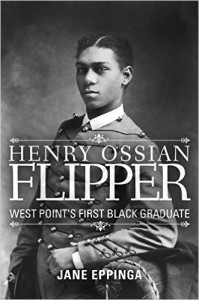 Published scholarship on black history in Texas is growing and we’d like to share with you some suggested readings, both current and past, from some of the preeminent history scholars in Texas and beyond. We invite you to take a look at our bookshelf page – including a featured selection – and check back as the list grows. A different selection will be featured each week. We welcome suggestions and reviews. This week, we offer, “Henry Ossian Flipper: West Point’s First Black Graduate,” by Jane Eppinga.
Published scholarship on black history in Texas is growing and we’d like to share with you some suggested readings, both current and past, from some of the preeminent history scholars in Texas and beyond. We invite you to take a look at our bookshelf page – including a featured selection – and check back as the list grows. A different selection will be featured each week. We welcome suggestions and reviews. This week, we offer, “Henry Ossian Flipper: West Point’s First Black Graduate,” by Jane Eppinga.
In 1878 Henry Ossian Flipper seemed destined for a long military career. Four years later, he was on trial at Fort Davis, Texas, for embezzlement of government funds and conduct unbecoming an officer and a gentleman.
Found “not guilty” of the more serious charges of embezzlement, the nation’s first black officer was court-martialed on the specious conduct charges. Thoroughly “humiliated, discouraged, and heartbroken,” Flipper would soon embark upon a career which in time would bring him more honor and fame than if he had remained in the military. One hundred years later, his name was cleared and the 1882 records of the black soldier were changed to reflect an honorable discharge.
The remarkable story of Henry Ossian Flipper, a young man born to slavery on the eve of the Civil War, and his struggle for recognition has left its mark on our nation’s history. Through extensive research of military documents, court records, appeals, and from Flipper’s personal journals and published papers, “Henry Ossian Flipper: West Point’s First Black Graduate” captures the sum and substance of a nation tom apart by political ambitions and extreme prejudices and reveals the uncertainty of acceptance and intolerance of blacks in America following Lincoln’s 1863 Emancipation Proclamation.
This Week in Texas Black History
Jun 27
Ronald “Ron” Kirk, the first black mayor of Dallas, was born on this day in 1954 in Austin. Kirk is the son of Willie Mae Kirk, a school teacher and civil rights activist, and Lee Andrew Kirk Sr., the first black postal clerk in Austin. Ron Kirk served two terms as Dallas mayor, 1995-2001. Prior to becoming mayor, he served as Texas Secretary of State (1994) under Gov. Ann Richards. Kirk graduated from Austin College in Sherman, and earned his law degree from the University of Texas. He served as U.S. Trade Representative from March 2009 until February 2013, and was the first African American to hold that Cabinet position as the president’s principal trade advisor, negotiator, and spokesperson on trade issues.
Jun 27
Lt. Henry O. Flipper, first black graduate of West Point, was court martialed and dismissed from the Army on this day in 1882 for “conduct unbecoming an officer and a gentleman.” Flipper was an officer in the Tenth Cavalry serving at Fort Davis (Texas) when he was accused of embezzlement as commissary officer. Flipper maintained his innocence until his death (May 3, 1940) and waged a lifelong battle for reinstatement in the Army. In December 1976, when a bust of him was unveiled at West Point, the Department of the Army granted Flipper an honorable discharge, dated June 30, 1882. An annual West Point award in honor of Flipper is presented to the graduate who best exemplifies “the highest qualities of leadership, self-discipline, and perseverance in the face of unusual difficulties while a cadet.”
Blog: Ron Goodwin, Ph.D., author, PVAMU history professor
Ron Goodwin is an assistant professor of history at Prairie View A&M University. Even though he was a military “brat,” he still considers San Antonio home. Like his father and brother, Ron joined the U.S. Air Force and while enlisted received his undergraduate degree from Texas Lutheran University in Seguin, Texas. After his honorable discharge, he completed graduate degrees from Texas Southern University. Goodwin’s book, Blacks in Houston, is a pictorial history of Houston’s black community. His most recent book, Remembering the Days of Sorrow, examines the institution of slavery in Texas from the perspective of the New Deal’s Slave Narratives.
Recent Posts
Death is nothing at all
“Therefore we are always confident, knowing that, whilst we are at home in the body, we are absent from the Lord: (For we walk by faith, not by sight:). We are confident, I say, and willing rather to be absent from the body, and to be present with the Lord.” 2 Cor 5: 6-8 As a child my father and I would watch “Hogan’s Heroes.” It’s a silly sitcom, but I remember how I enjoyed…(more)
The Everlasting Light
Ye are the light of the world. A city that is set on an hill cannot be hid. Neither do men light a candle, and put it under a bushel, but on a candlestick; and it givith light unto all that are in the house. Let your light so shine before men, that they may see your good works, and glorify your Father which is in heaven. — Matthew 5: 14-16 This is the month set…(more)
Submissions wanted
Historians, scholars, students, lend us your…writings. Help us produce the most comprehensive documentation ever undertaken for the African American experience in Texas. We encourage you to contribute items about people, places, events, issues, politics/legislation, sports, entertainment, religion, etc., as general entries or essays. Our documentation is wide-ranging and diverse, and you may research and write about the subject of your interest or, to start, please consult our list of suggested biographical entries and see submission guidelines. However, all topics must be approved by TIPHC editors before beginning your research/writing.
We welcome your questions or comments. Please contact Michael Hurd, Director of TIPHC, at mdhurd@pvamu.edu.

